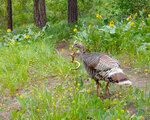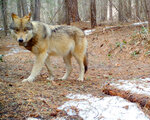


PLAIN – Every year, Beaver Valley Elementary releases a highlight reel of the most interesting video clips of wildlife caught on its game cameras. This year, the school captured enough exciting footage for two parts, one of which exclusively features animal babies.
“It’s pretty incredible when you look at it all together…how much is out there, and how many creatures you will just never see with your eyes, most likely, but we get them on camera on a fairly regular basis,” said Project Lead Jeff Layton. “The ability to see what's around us, kind of unfettered, is really cool and unique.”
The highlight reel is a culmination of an ongoing project in which students study local wildlife through game cameras, observing changes in the environment and animal behavior throughout the school year.
“What this project does is build a relationship between the kids and nature, which is a pretty cool relationship to build for kids,” said Beaver Valley teacher Eric Tiegel.
Layton has about a dozen cameras placed within 20 minutes of the school, along game trails and the river. Over the last three years, Layton and the students have figured out where to place these cameras through trial and error. They brainstorm together which direction, height, and locations will capture the animals they want to see.
“I ask the class, ‘If you could imagine yourself sitting in a glass box in the woods, and you're completely protected, and no animals know you're there, what would you want to see? What behavior would you want to experience?’” said Layton.
Layton sorts through anywhere from 30 to 150 clips each month, depending on the season, and brings the highlights into the classroom. They discuss what has changed over the last month, such as weather or other environmental factors, and how it affects animal behavior.
According to Layton, observing animals this way has an advantage over a zoo because the students are able to witness how animals act in their natural environment, unaffected by humans.
“When we're looking at footage in February, [we see] these coyotes are really struggling. They're wading through chest-deep snow, and they're finding very little food to eat. But say, in June, it's plentiful, and there are lots of animal babies, and things are really active. So, it really gives them a sense of what's happening in nature around them,” said Layton.
Layton spends an hour with the kids discussing what they’ve seen. Then, the students go on a field trip to one of the camera locations to pick up the memory cards themselves. While in the field, they take time to observe tracking signs and the plants in the area. The students also get a chance to bring a camera home for a month and observe what animals are exploring their own backyards.
“In a digital age when kids are spending more time behind a screen, having a program that is engaging and gets kids out into the mountains is fantastic. So it gives, from the teacher's perspective, a lot of what's missing in kids’ learning needs in the classroom,” said Tiegel.
The school has been able to record nearly every major species in the area, with the exception of the wolverine and moose, which Layton says are on the list. The camera has caught surprising moments such as a cougar swimming across the Wenatchee River, a mink stalking a mallard duck, and raccoons brawling with each other.
More uniquely, the cameras have been able to capture the endangered fisher, and report the sightings to wildlife officials for monitoring. The school was also one of the first groups to document the return of wolves to the Upper Valley. They learned how the wolves were collared and tracked, and even witnessed a wolf pup on camera.
“We talk about a lot of details and facts about animals, and, you know, they’re kids, so I'm not always sure that they're paying attention. And then a year later, I'll bring up the topic again, and the class is just rattling off this information…It’s amazing. Watching their engagement, and their knowledge, and their understanding of what's around them has been really gratifying,” said Layton.
The project is supported entirely by donations. Those looking to make a financial contribution or donate camera equipment can reach out to the Beaver Valley Parent Group at bvsparents@gmail.com.
“My hope is just that we have a collection of kids who appreciate and want to protect their environment,” said Layton.
Taylor Caldwell: 509-433-7276 or taylor@ward.media
Comments
No comments on this item Please log in to comment by clicking here